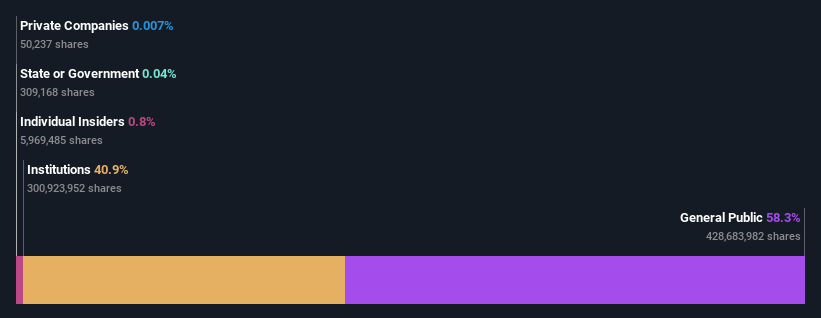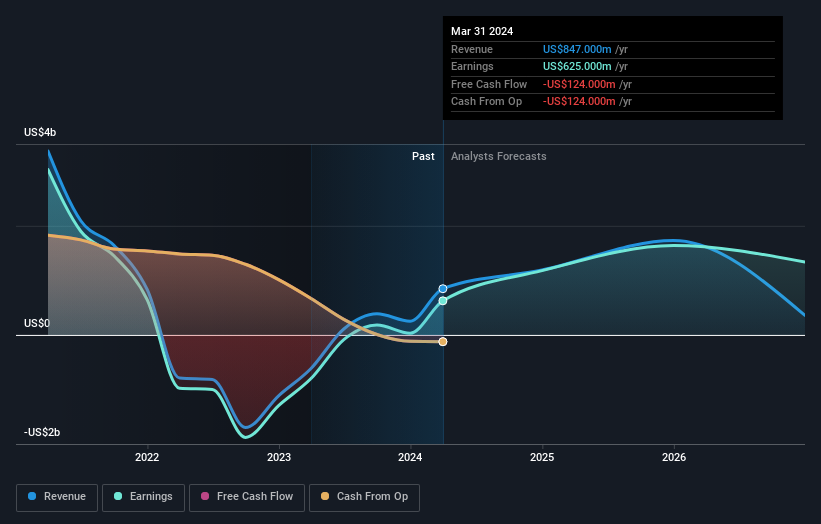Institutions along with retail investors who hold considerable shares inAGNC Investment Corp. (NASDAQ:AGNC) come under pressure; lose 3.1% of holdings value
Key Insights
AGNC Investment's significant retail investors ownership suggests that the key decisions are influenced by shareholders from the larger public
The top 25 shareholders own 30% of the company
A look at the shareholders of AGNC Investment Corp. (NASDAQ:AGNC) can tell us which group is most powerful. We can see that retail investors own the lion's share in the company with 58% ownership. In other words, the group stands to gain the most (or lose the most) from their investment into the company.
While the holdings of retail investors took a hit after last week’s 3.1% price drop, institutions with their 41% holdings also suffered.
Let's take a closer look to see what the different types of shareholders can tell us about AGNC Investment.
See our latest analysis for AGNC Investment
What Does The Institutional Ownership Tell Us About AGNC Investment?
Institutions typically measure themselves against a benchmark when reporting to their own investors, so they often become more enthusiastic about a stock once it's included in a major index. We would expect most companies to have some institutions on the register, especially if they are growing.
As you can see, institutional investors have a fair amount of stake in AGNC Investment. This suggests some credibility amongst professional investors. But we can't rely on that fact alone since institutions make bad investments sometimes, just like everyone does. When multiple institutions own a stock, there's always a risk that they are in a 'crowded trade'. When such a trade goes wrong, multiple parties may compete to sell stock fast. This risk is higher in a company without a history of growth. You can see AGNC Investment's historic earnings and revenue below, but keep in mind there's always more to the story.
AGNC Investment is not owned by hedge funds. The Vanguard Group, Inc. is currently the largest shareholder, with 8.9% of shares outstanding. For context, the second largest shareholder holds about 5.0% of the shares outstanding, followed by an ownership of 2.3% by the third-largest shareholder.
On studying our ownership data, we found that 25 of the top shareholders collectively own less than 50% of the share register, implying that no single individual has a majority interest.
While it makes sense to study institutional ownership data for a company, it also makes sense to study analyst sentiments to know which way the wind is blowing. There are a reasonable number of analysts covering the stock, so it might be useful to find out their aggregate view on the future.
Insider Ownership Of AGNC Investment
The definition of an insider can differ slightly between different countries, but members of the board of directors always count. Management ultimately answers to the board. However, it is not uncommon for managers to be executive board members, especially if they are a founder or the CEO.
Most consider insider ownership a positive because it can indicate the board is well aligned with other shareholders. However, on some occasions too much power is concentrated within this group.
Our data suggests that insiders own under 1% of AGNC Investment Corp. in their own names. It is a pretty big company, so it would be possible for board members to own a meaningful interest in the company, without owning much of a proportional interest. In this case, they own around US$57m worth of shares (at current prices). It is always good to see at least some insider ownership, but it might be worth checking if those insiders have been selling.
General Public Ownership
The general public -- including retail investors -- own 58% of AGNC Investment. This size of ownership gives investors from the general public some collective power. They can and probably do influence decisions on executive compensation, dividend policies and proposed business acquisitions.
Next Steps:
While it is well worth considering the different groups that own a company, there are other factors that are even more important. For example, we've discovered 4 warning signs for AGNC Investment (2 shouldn't be ignored!) that you should be aware of before investing here.
If you are like me, you may want to think about whether this company will grow or shrink. Luckily, you can check this free report showing analyst forecasts for its future.
NB: Figures in this article are calculated using data from the last twelve months, which refer to the 12-month period ending on the last date of the month the financial statement is dated. This may not be consistent with full year annual report figures.
Have feedback on this article? Concerned about the content? Get in touch with us directly. Alternatively, email editorial-team (at) simplywallst.com.
This article by Simply Wall St is general in nature. We provide commentary based on historical data and analyst forecasts only using an unbiased methodology and our articles are not intended to be financial advice. It does not constitute a recommendation to buy or sell any stock, and does not take account of your objectives, or your financial situation. We aim to bring you long-term focused analysis driven by fundamental data. Note that our analysis may not factor in the latest price-sensitive company announcements or qualitative material. Simply Wall St has no position in any stocks mentioned.
Have feedback on this article? Concerned about the content? Get in touch with us directly. Alternatively, email editorial-team@simplywallst.com

 Yahoo Finance
Yahoo Finance 

